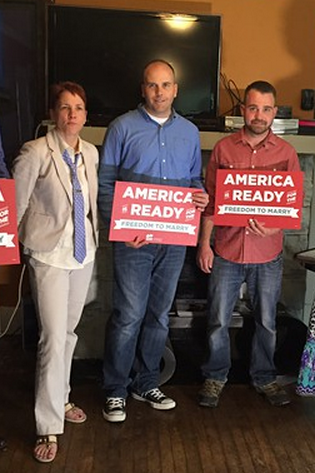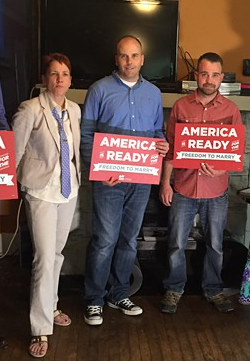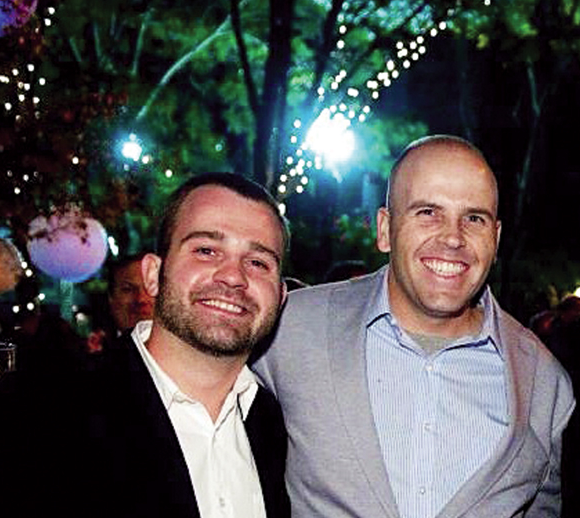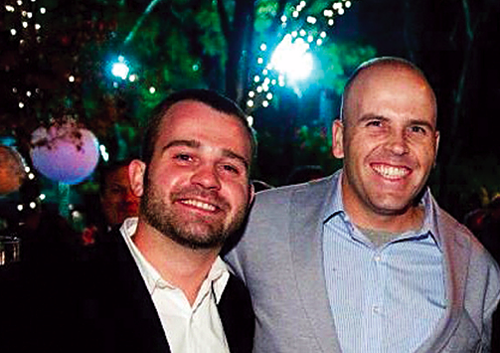
Maureen Holland, Ijpe DeKoe, Thom Kostura
When they married in New York in 2011, Ijpe DeKoe and Thom Kostura probably never imagined their marriage would make U.S. history. But after returning from a tour of duty in Afghanistan in May 2012, DeKoe, full-time sergeant in the Army Reserves, was transferred to the base in Millington. And suddenly, the couple found that their marriage wasn’t recognized by the state of Tennessee.
Fast forward to 2013, when DeKoe and Kostura signed on as one of three Tennessee couples challenging the state’s same-sex marriage ban. That lawsuit made its way to the Sixth Circuit Court of Appeals, along with similar suits from Kentucky, Ohio, and Michigan. But the Sixth Circuit ruled to uphold marriage bans in those states, a split from other appellate courts’ rulings on same-sex marriage. That ruling was appealed to the U.S. Supreme Court, and today, justices heard oral arguments in the case. Marriage equality advocates believe the Supreme Court’s decision in this case will decide the fate of marriage in the country once and for all. A decision is expected by June.
DeKoe, Kostura, and Holland were in the courtroom today, and they took a few minutes to share their experiences with the Flyer.
Give us a rundown of your morning at the Supreme Court.
DeKoe: We were up by 6 a.m. And we met down in the [hotel] lobby as a group. We were at the Supreme Court by about 7 a.m. They parked us in the back and had us walk around the building, which was pretty amazing. There were about 200 to 300 people lined up on the sidewalk, supporters. We did some interviews, and then the six plaintiffs from Tennessee walked into the Supreme Court at about 8:30 a.m., where we got to wait for about three hours. Sixteen of the plaintiffs went in for Question One, and then we swapped out for Question Two with us. We were in the courtroom for about an hour.
Did any of you speak before the court?
Holland: No. We had two oralists, Doug Hallward-Driemeier and Mary Bonauto. Mary went first, and she addressed Question One, as to whether or not the Fourteenth Amendment of the U.S. Constitution requires states to marry same-sex couples. And Doug did Question Two, which was if a same-sex couple is married someplace else, in a state like New York that recognizes their marriage, and they move to Tennessee, is Tennessee required under the Constitution to recognize that marriage?
During the last few minutes of Doug’s argument, during his rebuttal, he mentioned Thom and Ijpe and their situation as a personal explanation to the court about how this actually affects the lives of individuals and how it’s not just a philosophy. He mentioned all of the plaintiffs, including Thom and Ijpe.
We had 16 tickets to allot to plaintiffs for Question One, and we were allowed, in a very nice concession by the court, to swap out individuals, so we could allow a different set of 16 individuals into Question Two. So all of the plaintiffs could hear some of the arguments. All three couples on the Tennessee team were able to hear all of the presentation from both sides regarding Question Two.
From the analysis I’ve read today, I was a little surprised at some of the questions from the more conservative justices, like when Chief Justice Antonin Scalia asked why there was no gay marriage in ancient Greece. Did any of their questions catch you off-guard or strike you as weird?
Holland: We certainly prepare as best we can for a series of questions that might come to mind. Ancient Greece, I don’t know if that was exactly on our radar, but the arguments by respondents that same-sex marriage has been between a man and a woman throughout history is the same type of concept that we were prepared to address.
What were your impressions of how the case went today? Do you think the justices will rule in your favor?
Kostura: Ijpe and I do not have law backgrounds, and our oralist [Doug Hallward-Driemeier] went first for Question Two, the one that we actually witnessed. And [when we heard] the questions that were coming back from the justices, we were like, “Oh no, they’re going to go really conservative on this.” But then, the other side went, and it went from us thinking it was going to go unanimously against us to thinking it would go unanimously for us. So I think that my impression is that the justices were really rigorous to both sides. Ijpe and I walked away from it optimistically. We don’t know enough law to weigh in, but we know we have a very strong team. And that they argued the strongest case for us that they could.
DeKoe: It was very clear that the justices were asking the peoples’ questions, whatever side they took. The other part of it that struck me was that Doug got the opportunity to close [in Question Two], which was incredibly powerful, and it completely changed the tone of the room. He was able to incorporate each of the three stories of the Tennessee plaintiffs into his closing arguments, so it took this big theoretical problem down to a really human level. It was remarkable how that happened, and it was chilling to be mentioned in front of the justices.
Many seem to think Justices Anthony Kennedy and John Roberts will be the deciding factor. Is that the impression you got?
Holland: There was a feeling that the numbers might be better [than expected]. Obviously, you’re hoping for a 5-4, but you start to get the feeling that it could be more. But you’re not sure. There was a very positive feeling after Question Two. The Question One questions were harder to read, and there were definitely more questions on both sides. And it does feel like a narrower sense, from our perspective, that we would prevail. But I can tell you that the lawyers are hopeful that it’s at least 5-4, but we can see that some of the questions might tip some of the justices slightly up. But that wasn’t clear from Question One as much as from Question Two.
Much has been made of the anti-marriage equality protester who was ejected from the courtroom after he yelled something homophobic. Did any of you get to see that go down?
Holland: I did. That happened in Question One, just as the solicitor general is about to walk to the podium. The screaming and yelling begins with a protest or an outburst about God. And there was continual yelling while they got this person out of the courtroom. And it was quite loud. The justices asked the solicitor general if he’d like to take a moment because it was so disruptive. He started to walk away from the podium, and then he just turned right around and said, “Well, you know actually, I’m ready to go.” And he launched right in to his advocacy, which was wonderful to see and hear.
Kostura: From our perspective, because we were not in the courtroom at the time … as you can imagine, at the Supreme Court, there are a lot of logistics, and you get put into a lot of very specific places. Ijpe and I were in the lower level, and as [the protester] was being brought into the main gallery in front of the courtroom, the screaming was echoing down to our level. We weren’t allowed up to the gallery to see what happened. And of course, Ijpe and I, since it was such a controversial thing, when we hear all this screaming, we don’t want to run toward it. But that’s when Ijpe and I realized that there is this strong opposition, and there are these people who will try to break into the courtroom in order to protest.
Speaking of protesters, did you see many outside the courthouse? And did you feel like supporters of marriage equality outnumbered protesters?
DeKoe: There were definitely a lot more people for us. But I will give the protesters [against us] credit. They were very well organized. They came walking in and set up and had their PA going, and they got their message out. But they were a vocal minority and a very loud minority.
However, the friendly group far outweighed them. When we were inside the courtroom, we didn’t have any communications with the outside because we’d already turned off our cell phones. So we had no idea the crowd [outside] was growing. So it went from 200 to 300 people when we walked in to more than 1,000 when we left. As we walked through the main gallery and we stepped through those doors, we realized that the roar [of support] we could hear inside was even louder outside on the steps. It was a wall of sound in support. I could see the signs [from protestors], but I couldn’t hear anything negative because everyone was championing and yelling so loudly in our favor. These are people who took time out of their day and work week to come out and say “Your marriage has value. And we respect your marriage, and we want to be there for you while you’re inside fighting that fight.”

 Thom Kostura and Ijpe DeKoe
Thom Kostura and Ijpe DeKoe 